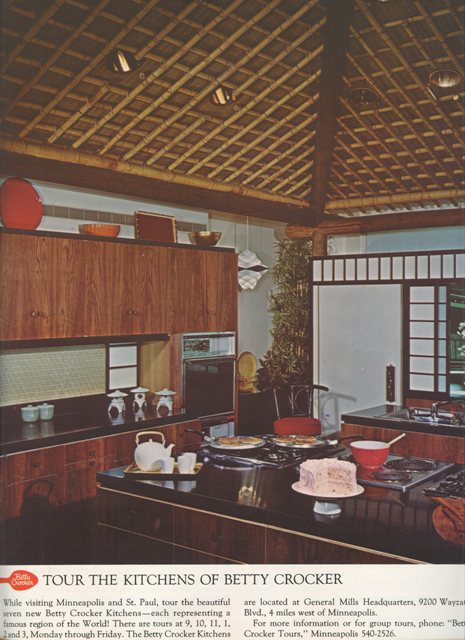This advertisement invites anyone visiting Minneapolis to tour the kitchens of Betty Crocker, who was one of the best known and most admired American women in the years after World War II. Crocker was not a real woman. She was the fictional household expert fabricated to personify General Mills, the food processing giant that had consolidated the Minneapolis milling industry during the 1920s.
The incorporation of General Mills was a significant turning point for the city, which was struggling to cope with the agricultural depression that had gripped the region since the end of World War I. The new company signaled a shifting economic base for the city, which was transformed from a milling capital to a center for new consumer industries by the end of World War II. The city’s grain mills stayed intact. But business leaders used the profits they had gleaned from milling wheat and timber to create a new generation of industries that were heavily dependent on sophisticated marketing techniques. General Mills sold pancake mix as well as plain flour; it devised labor-saving packaged foods that it had to convince traditional cooks to buy. This economic shift meant that business leaders became increasingly concerned with the national reputation of their city, as the image of the city and the products it products was inextricably connected. Starting in the late 1930s,the business community bought billboards, launched the Aquatennial and then supported the mayoral campaign of Hubert Humphrey, all in an effort to build a new reputation for a city known for labor violence, gangsters and anti-Semitism.
By the time this advertisement was published in 1968, Crocker’s kitchens had moved out of downtown Minneapolis to an expansive corporate campus in Golden Valley. A far cry from the old Grain exchange, which banned visitors from the grain trading floor, General Mills worked to lure customers to its headquarters, where they could sample new products. General Mills fashioned itself into a Disneyland-style tourist destination, building a series of test kitchens meant to evoke California, Hawaii, the Arizona Desert, Cape Cod, Chinatown, the culture of the Pennsylvania Dutch and colonial Williamsburg. Tours ran six times a day, Monday through Friday. To arrange a visit they had only to phone: “Betty Crocker Tours,” Minneapolis 540-2526.
